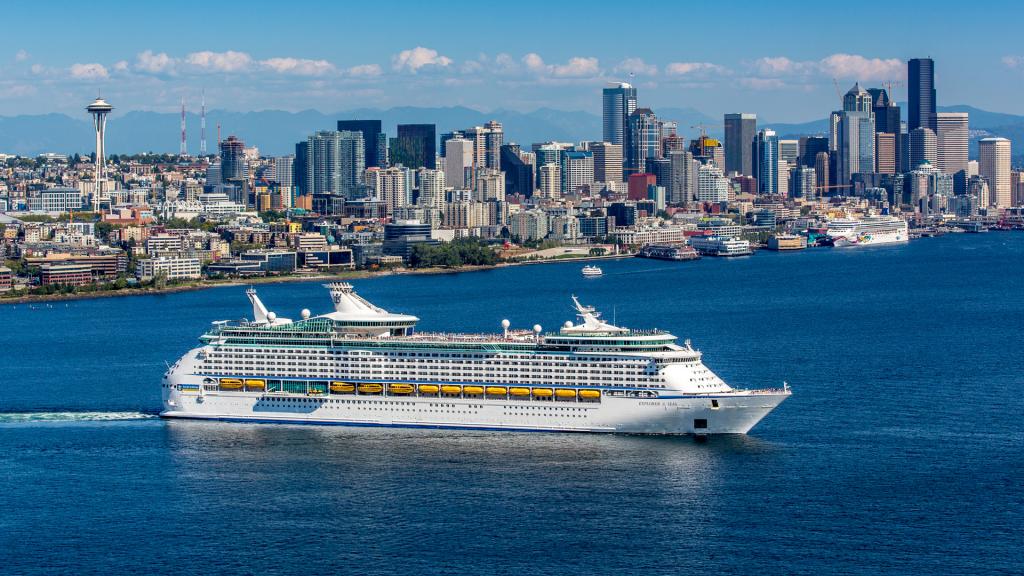Cruise ships in Washington waters
A voluntary agreement, called a memorandum of understanding (MOU), helps prevent wastewater discharges from large cruise ships into state waters. We first signed the MOU with the Cruise Lines International Association North West & Canada (CLIA-NWC) and the Port of Seattle in 2004. In the 2024 MOU updates, CLIA was removed as a signitory and member cruise lines were added. The member cruise lines pay for this program.
The waters subject to the MOU include Puget Sound and the Strait of Juan de Fuca south of the international boundary with Canada; along Washington’s Pacific Coast extending three miles seaward; and the Olympic Coast National Marine Sanctuary. Cruise vessel sailing from Elliott bay. Photo courtesy - Port of Seattle
The agreement:
- Bans wastewater discharges to Washington state waters from all cruise ships
- Except discharges treated with advanced wastewater treatment systems (AWTS) and outside Puget Sound No Discharge Zone.
- Allows us to inspect the wastewater treatment systems on each vessel.
- Requires cruise lines to sample and monitor wastewater discharges from their ships.
See a problem?
- Immediately report MOU non-compliance to: 206-594-0000 (available 24 hours a day).
- Immediately report “upset of disinfection" to Washington State Department of Health at 360-236-3330 (8 a.m. to 5 p.m.) or 360-786-4183 (after hours).
Cruise liners help protect Washington's marine waters
The MOU prohibits cruise ships from discharging blackwater (from toilets) and graywater (from sinks and showers) to Washington waters, unless the discharges are treated with advanced wastewater treatment systems (AWTS) and outside the Puget Sound No Discharge Zone.
Who does the agreement cover?
The agreement covers the brands owned and operated by the cruise companies that signed the agreement. This means the MOU does not cover all vessels that carry paying passengers. The following vessels types are not covered:
- Non CLIA-NWC member line smaller passenger ships or boats carrying less than 249 passengers.
- Washington state ferries (state ferries pump their sewage to on-shore treatment plants)
- Alaska Marine Highway ferries
- Large cargo ships, which are subject to EPA’s Vessel General Permit.
Requirements for cruise ships
Ships that opt to legally discharge via an AWTS must meet other stringent requirements, including:
- Advanced notification and documentation from ships planning to discharge via AWTS
- No discharges within a half mile of shellfish beds or within the Puget Sound No Discharge Zone
- Limits on certain pollutants, with specific sampling, testing, and reporting requirements
- Continuous monitoring for turbidity (murkiness) and disinfection
- Disinfection of all discharges, with capability to shut down immediately
Area covered by the agreement
The agreement applies to Washington marine waters, including:
- All waters south and east of the Canadian border
- Ocean waters up to three miles from shore
- Olympic Coast National Marine Sanctuary
Almost all cruise lines have opted to not discharge any sewage or graywater while in Washington waters covered by the MOU. Since 2012, every CLIA-NWC vessel in Washington has followed this practice.
Compliance
Each year the cruise lines must send us an annual report on their ships' wastewater practices. The MOU allows us to inspect each vessel's wastewater records and equipment to verify compliance. The MOU also allows us to complete random onboard equipment and records inspections on an annual basis.
Annual meeting
Each year, we meet with the cruise companies and the Port of Seattle to review the past cruise season and consider ways to strengthen the agreement. This meeting is open to the public.
Public webinar
We held the 2025 annual meeting on April 3, 2025, view the presentation that covered the 2024 cruise season.
Ongoing studies
Exhaust Gas Cleaning Systems (EGCS) are used on many cruise ships to comply with international air quality requirements limiting sulfur as an alternative to low sulfur fuels. EGCS’ are air pollution control systems that intake sea water to clean the exhaust systems resulting in washwater discharges. Ecology did an initial evaluation of EGCS washwater systems in 2018. The MOU partners agreed to further study EGCS washwater studies and their impacts in Puget Sound.
The Puget Sound Exhaust Gas Cleaning System EGCS Washwater Ecological Risk Assessment, led by Oregon State University and EcoAnalysts completed its data collection phase in 2024. The assessment team is currently working on questions still in the draft Puget Sound Exhaust Gas Cleaning System Washwater Ecological Risk Assessment. While this work continues, the pause on EGCS washwater discharge remains in place for the 2025 cruise season.
MOU Amendments
We welcome proposed amendments to the MOU from the public and our partners at any time throughout the year. Submissions may be emailed to evan.dobrowski@ecy.wa.gov. Proposals that meet the MOU criteria will be published on this webpage and reviewed by MOU signatories. Each year, at the annual public meeting, proposals from the previous year will be presented and voted on. This meeting is held at the beginning of each cruise season in Seattle. For an amendment to be adopted, it must receive unanimous approval from all MOU signatories.
Proposed Amendment Requirements
To be considered, proposed amendments must:
- Address cruise ship activity within MOU waters.
- Not duplicate existing cruise ship regulations or MOU provisions.
- Use the MOU Amendment Proposal Template - Appendix F and include:
- A summary of the proposed amendment.
- A justification explaining its applicability and alignment with the MOU and existing regulations.
- The basis for the amendment, such as the environmental concern it addresses.
- The anticipated benefits of the amendment.
- The potential impacts, including implementation details.
- Relevant supporting data that highlights its importance, relevance, or value.
Send proposed MOU amendments to Evan Dobrowski at : evan.dobrowski@ecy.wa.gov
Stay informed
If you like to receive notifications about the MOU, join our email list
Previous cruise season reports
2024 Cruise season inspection reports
2023 Cruise season inspection reports
Related links
Contact information
Evan Dobrowski
Water Quality compliance specialist
evan.dobrowski@ecy.wa.gov
206-594-0175


.jpg)